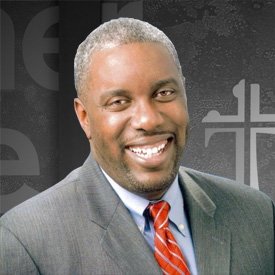There is something interesting that happens as Christians when we approach and study other faiths. I have found it to be the norm, rather than the exception, that we approach other faiths without grace or applying the gospel. Instead, we just look for intellectual karate-chops, ways that we can try and force people to show them they’re wrong in conversation with quick and succinct blows.
As Christians, our language and conversation with others should be completely full of love and grace. Let your speech always be gracious, seasoned with salt, so that you may know how you ought to answer each person (Col 4:6).
This is why I loved reading Thabiti Anyabwile’s recent book The Gospel for Muslims: An Encouragement to Share Christ with Confidence. To be honest, when I first approached this book I slipped back into my default mode. From the outside, Thabiti’s book is very short, and I initially approached it hoping for quick and easy ways to “win” arguments against Muslim followers. What I received instead was a great primer on the gospel, my need for Jesus, and how that needs to be the center of any conversation I have with a Muslim follower. Despite a few shortcomings that I will detail below, The Gospel for Muslims is a fantastic book for any church or Christian looking for an introduction to Christian-Muslim interfaith dialogue.
Praise
As a former Muslim believer, Anyabwile is well aware of the Islamic though process and its doctrines. It is his background and conversion experience that has given Thabiti the heart to write this book, and that is evident on every page. Pastor Anyabwile really believes, as we should all believe, that we are to serve our Muslim neighbors and be salt and light to them.
The strongest point of Pastor Anyabwile’s book is its emphasis on the gospel and the need for the gospel in any and all conversations with Muslim believers. This is not an apologetics book, and it is not intended to be so. As Anyabwile says in his introduction, “Apologetics is a helpful discipline, but it is not evangelism” (p. 14). The books primary focus is encouraging Christians to believe that the gospel really is the power of salvation to all who might believe. This is where Thabiti is at his strongest, encouraging even the newest believer that they know what they need to engage a Muslim follower.
Divided into two parts, the first part of the book focuses on the gospel itself. This is a primer for the most learned or unlearned Christian, succinctly hitting all the key points of our faith on God, man, Jesus, repentance, faith, etc. The second part of the book contains practical suggestions with Muslims.
This second part of the book contains some very helpful tips that I really think are crucial for the church today. In chapter 8, Pastor Anyabwile focuses on the necessity to be hospitable in our conversations with Muslims. This may sound elementary, but isn’t it something that is really hard to do – especially in heated conversation?
The following chapter focuses on using your local church to reach out to your Muslim neighbors. As a member of a relatively new Acts 29 church, I really loved this chapter and that Thabiti would think to include it. Though short, this chapter contains a lot of helpful encouragement and advice for the local church in reaching it’s Muslim neighbors.
Pastor Anyabwile also includes a helpful chapter on reaching the African American Muslim community. As an African American and former Muslim, Anyabwile speaks with grace in regards to this issue and I found the chapter to be very helpful.
Criticisms
On the whole, I loved The Gospel for Muslims, Pastor Anyabwile’s heart for that community, and the centrality of the gospel on every page of the book. There is however one criticism I would offer for the book. Even though my criticisms are few, I do believe there is one fairly serious issue worth noting in the text.
Thabiti makes a few statements throughout the book in regards to a Muslims approach to the Bible. He correctly states that many (if not all) Muslims believe that the Bible is completely corrupted in its current state, yet he incorrectly states that they have no reason to believe as such.
One of the greatest problems in approaching the Quranic text is that it is not wholly unified in any sort of narrative or exhortational fashion. The Qur’an is broken up into chapters, or suras, which were received by Mohammad throughout his lifetime in various revelations. Muslim scholars do their best to try and figure out which verses (ayats) came before others, but there is much disagreement. Complicating this issue is the Islamic doctrine of abrogation (nasikh). This doctrine states that when two verses conflict, the most recent verse abrogates – or overwrites – the previous verse. This is seen best from the Qur’an itself:
2:106 None of Our revelations do We abrogate or cause to be forgotten, but We substitute something better or similar: Knowest thou not that Allah Hath power over all things?
13:39 Allah doth blot out or confirm what He pleaseth: with Him is the Mother of the Book.
Thabiti is correct when he references the Qur’an as stating at times that Muslims should be in agreement with Christian or Jewish teachings. One such Sura Thabiti references is below:
5:46-47 And in their footsteps We sent Jesus the son of Mary, confirming the Law that had come before him: We sent him the Gospel: therein was guidance and light, and confirmation of the Law that had come before him: a guidance and an admonition to those who fear Allah. Let the people of the Gospel judge by what Allah hath revealed therein.
Pastor Anyabwile’s conclusion is that we should then work to convince our Muslim neighbors that they must listen to our Bible because their Qur’an says so, and that there actually isn’t any grounds in the Qur’an for Muslims to say the Bible is corrupted. However, a quick gloss of Quranic text would give us a different result:
3:78 There is among them a section who distort The Book with their tongues: (As they read) you would think It is a part of the Book, But it is no part Of the Book; and they say, “That it is from Allah”, But it is not from Allah.
2:113 The Jews say: “The Christians Have naught (to stand) upon”; And the Christians say: “The Jews have naught (to stand) upon.” Yet they (profess to) study the (same) Book.
5:14 From those, too, who call Themselves Christians, We did take a Covenant, But they forgot a good part of the Message that was Sent them: so we estranged them…
The above verses are a brief synopsis of texts that Muslims interpret to say that the Bible is corrupted and that Christians use false texts. This rightly is in disagreement with the Sura Thabiti quotes in his book, but that is not a conflict because of the doctrine of abrogation.
Anyabwile hits on this idea a few times in the book, and I fear the consequences of not appropriately fleshing out this subject in the book. Not only that, I’m afraid his conclusion is simply or prematurely wrong, and that it will convince many readers that they can show their Muslims neighbors to believe in the Bible because their Qur’an says so.
Conclusion
I loved The Gospel for Muslims. It was short, simple, and to the point. The book was a great encouragement and reminder that the gospel must be at the center of our evangelistic efforts.
However, the few issues I have with the book are glaring. As the book is short and is not meant to fully flush out Islamic doctrine, I think Pastor Anyabwile gets the issue of the Islamic perspective of the Bible completely wrong, or at least not fully examined. In addition, since the text is so short, there really wasn’t much room to elaborate on some key Islamic doctrines. I really think the book might’ve benefited from an extra 20 pages spread throughout the book to provide a few more details and insights into Islamic beliefs.
There are a few caveats to keep in mind, and The Gospel for Muslims might best be used with some additional resources and information compiled from other sources. Despite what might be a few shortcomings, this is a book I would definitely recommend to others and use in the future when teaching or discussing Islamic evangelistic efforts.
The weight of this topic requires a lengthy blog post. I recognize that this is much longer than most people care to read on a blog site, so for convenience I have provided 5 break points in the article that you can click on and come back and read at any time:
We Are Asking the Wrong Question
Why is There Pain and Evil in the World?
So How Should Christians Respond?
—–
It is likely that since the beginning of time, every civilization has dealt with the same issue. Certainly since the beginning of written history, each succeeding generation resurrects one big question: Why is there pain and evil in the world? The question can take many forms; these variations almost always add God into the mix, something to the effect of “If God is all-good, and God is all-powerful, why does evil exist?”
In a post-modern era of no absolutes, attempts to respond to the “big questions” are now nothing but over-clichéd attempts to make people feel better about themselves. The Church should be a beacon of truth and light that provides a unique and Christian answer to the question.
Unfortunately, this isn’t the case.
We have lost our way. The Church has blended worldly desires for cheap and quick solutions with a slight spiritual blend to offer nothing more than a sugar-coated shell that is hollow on the inside. We have fallen so far that we now answer the “Problem of Pain” with answers such as:
- “God just needed another angel in heaven” (Christianity does not teach that we become angels after death, so I have no idea why we allow this idea to fester).
- “Evil is just the absence of God” (so God is no longer big enough to be all-present?)
- “This [insert natural disaster, economic collapse, war] is God’s punishment on [insert people group] for doing [insert sin]” (OK, but seriously, when did everyone become a prophet? And show me a Biblical precedent for natural disasters being a routine punishment from God).
- “You didn’t have enough faith for good things to happen” (Riiiiight).
- “It is only pain and suffering in our eyes. You just need to change your perspective” (So is there no such thing as absolute evil or absolute good?)
- “God isn’t really ‘sovereign’, that is why we have free will to do what we want” (If you don’t believe in a god who can usurp man’s free will, you don’t believe in a god at all).
These are trite answers and only serve to undermine the riches of Christian faith.
I have a problem with this so-called “Problem of Pain.”
So What Is the Problem?
The real issue being discussed is the existence of pain, evil and suffering in the world. We like the idea of a good and loving god, but often it is hard to reconcile that idea with everything we see in the world around us. What about all of the wars, people dying of starvation and natural disasters, sex trafficking, cancer, murder, disease? Why do bad things happen to good people? What about death?
The philosopher first credited with ‘debunking’ God because of the existence of evil, pain and suffering was a man named Epicurus (341-270 BC). A Greek philosopher by trade, Epicurus narrowed down the problem of reconciling evil with God in a simple argument, called the Epicurean Paradox:
Is God willing to prevent evil, but not able? Then he is not omnipotent.
Is he able, but not willing?Then he is malevolent.
Is he both able and willing? Then whence cometh evil?
Is he neither able nor willing? Then why call him God?
The Epicurean Paradox could also be narrowed down into three easy steps, which I will refer to for the remainder of this article:
- God is all-powerful (omnipotent).
- God is all-good.
- Evil exists.
Because of point three, Epicurus would say, God is either not all-powerful or he is not all-good. This shouldn’t be an unfamiliar concept to anyone. Surely everyone has experienced some sort of pain, suffering, or evil that causes them to say “How could a good God exist?”
Let us try to address these questions: How could a loving God allow bad things to happen to good people? How could a good God allow evil to exist?
We Are Asking the Wrong Question
I am going to make the argument that the above questions are invalid, and here’s why:
There’s no such thing as a good person.
That’s right. None of us, no one, not one, is good. Jesus himself said, “…No one is good except God alone” (Luke 18:19b).
The Bible teaches that we are all inherently born with a sin nature. We all have a bend towards sin from the day we are come out of the womb. It is because of this sin nature that we are tainted and corrupt. The book of Romans has a lot to say about the existence of evil. Look at what its author Paul has to say:
None is righteous, no, not one;
no one understands;
no one seeks for God.
All have turned aside; together they have become worthless;
no one does good,
not even one.”
“Their throat is an open grave;
they use their tongues to deceive.”
“The venom of asps is under their lips.”
“Their mouth is full of curses and bitterness.”
“Their feet are swift to shed blood;
in their paths are ruin and misery,
and the way of peace they have not known.”
“There is no fear of God before their eyes.”
You might be reading this while saying to yourself, “This guy is off his rocker! He’s assuming I’m going to believe what the Bible says.” I’m not, because you already know in your heart that what this passage says is true.
Still fighting it? Then ask yourself the following questions: Who taught you how to lie? Who taught you how to covet something that wasn’t yours? Who taught you how to get angry and throw temper tantrums as a child? No one did. Those desires and sinful bends were in you since you were born.
All of this is to say that when we ask the question “Why does God allow bad things to happen to good people?” we are asking the wrong question. It is a man-centered question which doesn’t put God first. This question must be asked in a theocentric (God-centered) manner, not an anthropocentric (man-centered) manner. Author and philosopher CS Lewis said it best when he said:
The problem of reconciling human suffering with the existence of a God who loves, is only insoluble so long as we attach a trivial meaning to the word ‘love’, and look on things as if man were the centre of them. Man is not the centre. God does not exist for the sake of man. Man does not exist for his own sake. “Thou hast created all things, and for they pleasure they are and were created.” We were made not primarily that we may love God (though we were made for that too) but that God may love us, that we may become objects in which the Divine love may rest ‘well pleased’.
So why does God allow bad things to happen to good people? He doesn’t, because there are no good people. Let’s take a look at the second question to get a better understanding of why evil, pain and death exists in the first place.
Why is There Pain and Evil in the World?
As for the latter question, why does God allow evil to exist? Simply put, because we do not exist in a vacuum. Were God to simply eradicate evil, we would not exist. Evil cannot go unpunished, and as Scripture puts it, “The wages of sin is death” (Romans 6:23). This isn’t just a physical death. This is the death of all things that are good and right. The world is no longer the way it was supposed to be. Why does evil continue to exist? Because we have chosen it. As contributors in the human race we have all chosen to go our own way, to turn from God, and to give in to our own desires. Our anger, lust and pride mixes and stirs into one giant blue and green sphere of hostility, hatred and death floating in space.
Here’s the kicker: we’re all guilty. Every single one of us has contributed to the evil, pain and suffering that exists in the world. We have at one time wounded, ignored, and hurt others in ways they’ll never forget. We all lust after and covet things that we shouldn’t have, which causes us to chase after all of the wrong things. No one is exempt from the curse of sin and death – “for all have sinned and fall short of the glory of God” (Romans 3:23). All. Not some. All. Me, you, everyone.
Why does evil exist? Because we’re sinners.
So How Should Christians Respond?
With the above foundations fueling our understanding of the questions at hand, I further suggest that in reality there is no “Problem of Evil” at all. The Epicurean Paradox is a paradox itself, because there is no paradox. Properly understood, a good, loving and all-powerful God is perfectly reconcilable with the existence of pain and evil.
And this is why I have a problem, a bone to pick if you will. So many Church members today are completely misinformed, to the point that we don’t even understand that the answer is sitting right in front of us.
The Christian faith does not teach that you need to believe good things can happen in order for them to happen, that we become angels after death, or that God is unable to prevent evil. The Christian faith does not teach that God is malevolent, likes to watch us suffer, or is generally uninvolved with our lives.
On the contrary, the Christian faith teaches that God is SO good, SO loving, that he can bring the best good from the worst evil. As the early church thinker St. Augustine said,
Since God is the highest good, He would not allow any evil to exist in His works, unless His omnipotence and goodness were such as to bring good even out of evil.
There are examples of this all over the Bible. God is a redemptive God, and we consistently see him turning evil into good in the lives of people like Joseph, David and Paul. But what better place to see this take place than on the work of Christ on the cross! It is with the death and subsequent resurrection of Christ that we see the ultimate example of good coming out of evil. What the world intended to use to destroy God, God intended to use to purchase salvation for all of those who would believe in him for life. How can one conceive of a higher good than that!? As condemned sinners, who brought evil and death upon ourselves, God still looked upon us and said “This will not do!”
For while we were still weak, at the right time Christ died for the ungodly. For one will scarcely die for a righteous person—though perhaps for a good person one would dare even to die— but God shows his love for us in that while we were still sinners, Christ died for us. -Romans 5:6-8
This is the essence of the Christian faith. This is the gospel. This so-called “Problem of Evil” is completely squashed in the work of Jesus on the cross. What amazing, undeserved grace!
Summary
Properly understood, there is no “Problem of Evil.” The questions we often use to asses this so-called problem are the wrong questions because they focused on men rather than God. We presuppose that we deserve good things to happen to us, when really we all deserve death.
We began by looking at the Epicurean Paradox, which we summarized as follows:
- God is all-powerful (omnipotent).
- God is all-good.
- Evil exists.
When we stop at point 3, our first inclination is to think that point 3 would contradict point 1 or 2. However, point 3 is not the end of the story. As author and apologist Dr. Greg Bahnsen points out, we must continue on to a point 4:
4. God has a morally sufficient reason for the evil which exists.
Christianity teaches that God is so immensely good, so far beyond our comprehension, that He can produce good from even the worst and most tragic of evils. Now, let me be clear; this isn’t to say that we are always going to know the exact reason for individual circumstances of pain and evil. We can’t always know why someone has cancer, or why our friends would be killed, or why terrorists would kill hundreds of people. We can’t always know why we’d lose our job, or someone would choose to cause us immense pain and hurt.
But we can be sure of two things.
The first is that the consequence of our sin is death and suffering. All of us have sinned, and we have all contributed to the pain and hurt we see in the world. What is the meaning of all of this death and suffering in the world? The consequences of sin are outrageous.
Second, we have an amazing, sacrificial and loving Savior. We have a God who does not desire us to eternally face the consequence of our sin, but wants to reconcile us and redeem us, allowing us to experience the grace and mercy that only the perfect Creator can give. We can have confidence that even though we have trouble in this life, Jesus has overcome the world.
I know there will be plenty of non-Christians who read this. And I know every one of you have gone or are currently going through some kind of hurt and some kind of pain that causes you to be angry and bitter with the idea of a loving and all-powerful God. Come, taste and see. The Lord is good. I invite you to send me a message. Let’s talk about it. There is hope, there are answers, and they’re found in Jesus.
Christians, we have a better answer than what the world can provide. It just is. When you feel hurt or pain, when you see evil in the world, cling to the cross. Rejoice in our Savior. And then go help someone else who can’t reconcile pain and evil with the idea of a loving God. We have the answer for reconciling pain and evil, for bringing hope to a dark world, and for restoring hurting people with a loving God. Don’t give in to cheap, worldly answers.
The gospel changes everything.
I was recently talking to a friend (thanks, Tom) about the level of gospel-related imagery present in many Hollywood movies today. We specifically talked about the latest Batman trilogy – one of the reasons everyone loves Batman is that he’s the unlikely hero who is willing to sacrifice himself for the sake of others. Isn’t that why we love the idea of heroes today? One of the subplots in last years Avengers was that Tony Stark wasn’t a true hero until he learned what it meant to sacrifice himself and put his own life on the line. Captain America is the selfless boyscout who, despite being mocked and humiliated by his peers, continually demonstrates that others lives are more valuable than his. Selflessness, humility, sacrifice – things we love to see in our ideal heroes – are all things that Christ demonstrated through his earthly ministry and ultimate death on the cross.
In this years Man of Steel, Christ-like gospel imagery is absolutely everywhere, and the American public is going to eat it up. I am doubtful that either Zack Snyder or Christopher Nolan intentionally placed this imagery in the movie because of their faith (as far as I know, neither are professing Christians). Regardless, they were fully aware of the similarities between Christ and Superman, and were fully aware that this type of hero is exactly what the public wants to see.
Below I’ve compiled a list of some of the more obvious Christ-related imagery in the film. I am sure there are plenty more that I didn’t see during my first screening. While not an exact one-to-one likeness between Christ and the Superman portrayed in this film, the glaring connections cannot be ignored. I have been careful not to place any spoilers in this list, and there isn’t any information in the list below that you wouldn’t know from watching the previews:
- Many characters throughout the film are routinely seen wearing cross necklaces (this would otherwise be unmentionable if it weren’t for other imagery)
- Kal-El (Superman) is sent by one father (Jor-El) and raised by another (Jonathan Kent)
- Kal-El is naturally born, of the same essence as his father – while his enemy (Zod) is a created being
- At one point in the movie, child Clark is seen reading Plato – the influential philosopher of Christ’s time
- Numerous times in the film Superman holds his arms out in the form of a cross in the movie, most noticeably after being told he has the capacity to “save them all” (the human race)
- At a time of serious reflection, Superman has a conversation in a church underneath a stained glass window of Jesus praying in the Garden of Gethsemane (the place where Christ pleaded with the Father before heading to the cross)
- Superman willingly hands himself over to authorities (as seen in the trailers) – just as Christ did to those who arrested him
- Clark is routinely seen as the outcast and mocked and beat up
- There is an interesting conversation about a lack of morality (what the bad guys have) as their evolutionary advantage, while Superman’s weakness is his morality and compassion – and in the end “evolution always wins”***
- Superman explicitly mentions he is 33 years old – the age widely agreed upon for Christ when he was crucified
- Like Christ during his earthly ministry, Superman learns obedience to the mission his father sent him to Earth for
- Jor-El, Kal-El’s father, explains that Kal-El will be “like a god” and will give the people of Earth “something to strive towards.” Ignoring the “like a” god part, Christ is similarly the example all Christians are meant to strive for.
I would wager that this film has the highest amount of gospel-imagery in Hollywood outside of The Passion of the Christ. This imagery was obviously intentional, and is an obvious sign of one very important thing: we crave a Christ-like savior. I am confident that I would be hard-pressed to find anyone who would disagree with the major themes of Christ’s ministry: true love being willingness to lay down one’s life for another, loving others more than ourselves, being thankful for everything we have, forgiveness, his willingness to die for those who hated him – these are all things that our society almost universally agrees on as being great qualities of a leader and hero. Christ’s life and teachings changed the world, and since the first century these have been values that have changed the course of our society. This ultimately begs the question: Why is it that we love everything about Christ, and look for his virtues in our modern heroes today, yet we stop short of the most important thing he preached – faith in him?
Subjective Christ-imagery gulping aside, objectively this film was fantastic. It had everything I was looking for, the emotional pull of an outcast torn between two worlds – and the action Superman is worthy of on the big screen. Seriously, this film easily outdoes Avengers in the action department, and I loved every minute of it. The effects were fantastic, and watching Superman learn his limits as the fights went on was a great touch.
Ultimately, this film is a Sci-Fi origin story about an alien trying to fit in. The film begins on the planet Krypton, and I really loved the world that is portrayed. The scenes here shape a large portion of the plot of the film, and there is an added touch of witnessing a dying civilation that is past its prime. A stand-out performance in this portion of the film is Russel Crowe as Jor-El, who is an absolute beast of a man in every scene he is in.
Henry Cavill’s Superman is not the Donner-age Christopher Reeve boyscout most people are used to. Long gone are the days of the Boy Scout who saves cats from trees. This Superman is a brooding figure, troubled by a past of learning what it means to hide who he really was. That being said, as an origin story, this film does an excellent job of setting up where Kal-El’s moral compass comes from, and his boyscout do-good symbolism is something foreshadowed for future films.
Michael Shannon does a fantastic job of portaying a highly-motivated yet deeply flawed villain – a consequence of the dying society seen on Krypton. He steals any scene he is in, and is suitably creepy as a world-conqueror.
Worth mentioning are the performances by Kevin Costner as Jonathan Kent (Supermans adopted father) and Amy Adams as Lois Lane. Kevin Costner owns probably the most touching scenes of any movie this summer. The scenes of Clark growing up with his adopted father were an excellent touch on the film. In addition, Amy Adams portrays a much smarter version of Lois Lane, one who doesn’t seem so absent minded and blindly wandering into danger.
Hanz Zimmer also does a magnificent job with the new theme for this new Superman. Many people were concerned it would be hard to follow behind John Williams’ masterpiece score from the 1978 film, but Zimmers soundtrack does not dissapoint. It fully engages and melts all your senses.
My biggest critique of the film is that there were some serious pacing issues at times. Much of the film is told through flashbacks, and jumping around from present time, to flashbacks, to Zod, back to present, etc. could be a little jarring. I understood why they did the film this way, but I think it could have been simplified at times. Many critics also complained about “too much action”, and while that was exactly what I was looking for – the last half of the 2.5 hour run time is pure action – it may not be for everyone.
Ultimately, I loved this film. I ate up the gospel-imagery, which might make me a little biased, but objectively this is a great summer film with some emotional weight that many blockbusters don’t have. I give it a very high rating on an arbitrarily ambiguous scale.
***Note: For anyone who thinks I’m making this comment out of animosity towards science, that is not the case. I am a pro-science, Old-Earther (likely in the billions), Bible-believing Christian. I just found this dialogue interesting, as a lack of morality is the logical conclusion to a humanisitic-only evolutionary worldview.
For your Friday: Five comparisons between cults and Christianity.
1. A cult will give you a set of rules and things to do to achieve special status or salvation.
Christianity says: “For by grace you have been saved through faith. And this is not your own doing, it is the give of God.” – Ephesians 2:8
There is nothing we can do to achieve right standing before God.
2. A cult will give you a set of requirements you must keep to maintain your status in the group.
Christianity says: “Come to me, all who labor and are heavy laden, and I will give you rest.” – Matthew 11:28
Working to maintain our status or salvation is a false idol that leads to fatigue and a tired soul.
3. A cult will tell you not to associate with those outside of your group who have rejected your message – including your family.
Christianity says: “But I say to you who hear, Love your enemies, do good to those who hate you, bless those who curse you, pray for those who abuse you.” – Luke 6:27-28
Christians must actively engage and love those outside the church.
*Editors note: The point I am communicating here is not that all those outside the church are our enemies. What I am attempting to communicate here is that if we are to love EVEN our enemies, and pray EVEN for those who would seek to abuse us, then certainly we are to love and engage anyone outside the church, enemy or not.
4. A cult will claim special revelation that is only achievable by joining their group.
Christianity says: “When the Spirit of truth comes, he will guide you into all the truth, for he will not speak on his own authority, but whatever he hears he will speak, and he will declare to you the things that are to come.” – John 16:13
The Holy Spirit is given to all who believe, not those who give a certain amount of money or do certain things. Jesus is the Way and the Truth. Anyone who claims special revelation outside of Christ is leading you astray.
5. A cult will deny either the work or deity of Jesus Christ.
Christianity says: “No one who denies the Son has the Father. Whoever confesses the Son has the Father also.” – 1 John 2:23
“But when Christ had offered for all time a single sacrifice for sins, he sat down at the right hand of God…For by a single offering he has perfected for all time those who are being sanctified.” – Hebrews 10:12, 14
Christ is the Son of God, who has made a one-time sacrifice for all sin.






